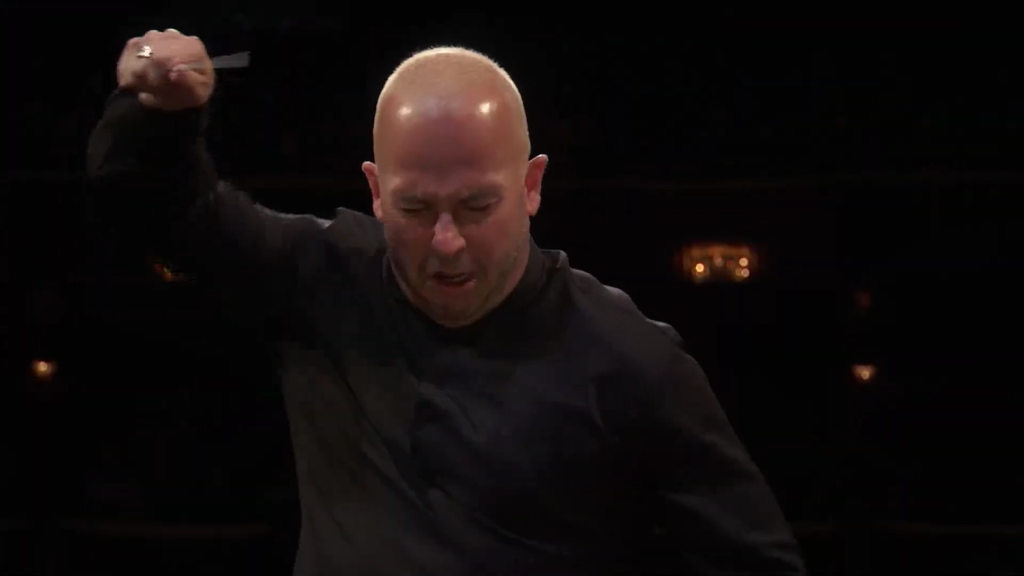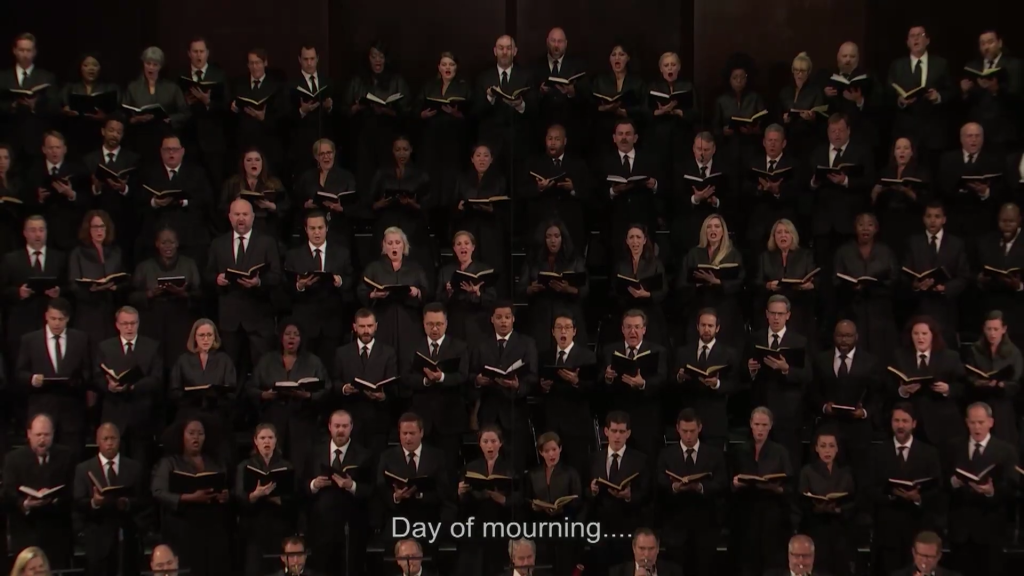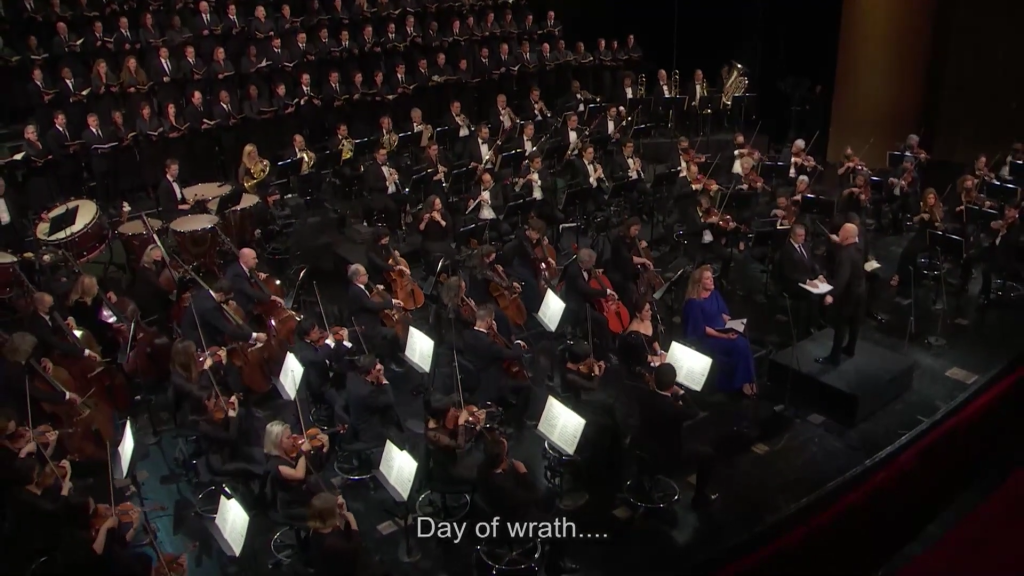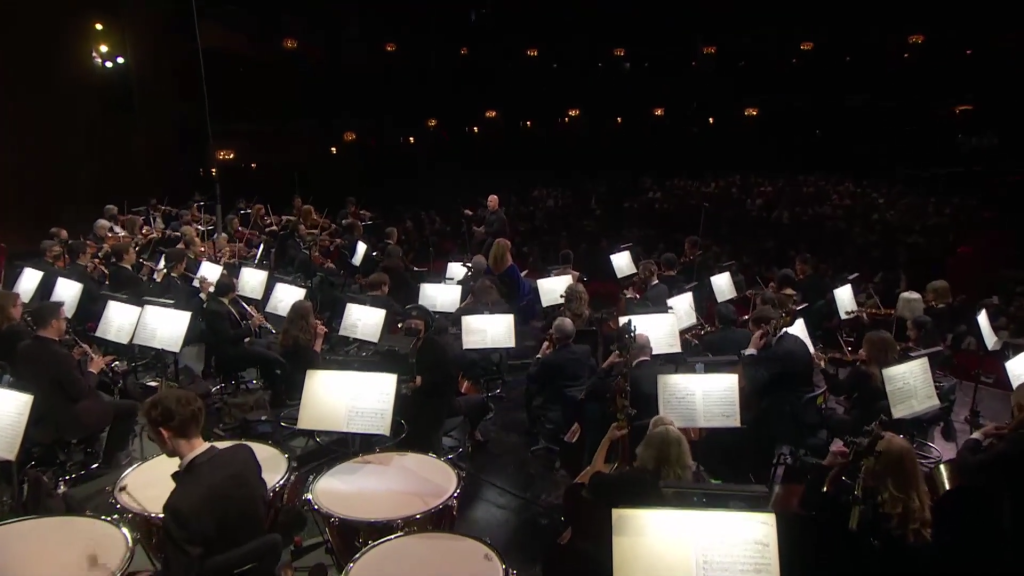This was offered as my sermon this morning in St Chad’s, New Moston and St Paul’s, Blackley Churches. There may or may not have been some embellishments in the delivery of each, but here is the main text of what was said. Readings: Acts 3. 12 – 19 and Luke 24. 36b – 48 (Third Sunday of Easter, RCL Year B).
Everybody has a different viewpoint on things, and everybody experiences the world differently, which goes a long way in shaping that viewpoint.
I want to try a little experiment here, and play you an excerpt from a famous piece of music:
From within this piece of music, there are five different viewpoints and experiences.
The conductor – he’s the one who sets the tempo and counts them all in so they play together. He has this wonderful view of all the musicians in front of him, from the lead violin on his left to the bass singers on the back row of the chorus. He wields mighty power in that little fibreglass baton, and around 150 singers and players all breathe at the same time to produce wonderful music under it.

The brass section – best section in the world – gets to make a lot of bright noises that put the sparkling edge on the music (I may be biased here), who wouldn’t want to be sitting in this wonderful section for this performance??

The timpanist – very important, without him we don’t hear those immense hammer blows that tell us something of God’s wrath. But this is a hard job – to time the strike to within a nanosecond of perfection, with both hands on a bouncy surface that can resound and cause percussive shock to travel up your arms if you get it wrong.

The chorus – a beautiful and massive blend of voices who all sing together to support the orchestra singing to the limits of their lungs.

And the soloists, who in this excerpt just sit there while the rest of them get on with it. They have a special part to play at key moments through this whole piece of music… but not at this moment they don’t.

But what about those sat in the audience?

There will be people in the audience on this clip who had never heard this music before, who maybe leapt out of their seats when those first crashing big sounds are heard; there will be those who know what to expect and lean forward eagerly; those who know what to expect, but cover their ears…
And there will be people watching the recording of it saying “oh isn’t that from… that film/advert etc”
Others still will be saying – “It’s not fast enough!” “It’s too slow!” “Urgh, this is classical music and it’s BORING”
And then there were the people who were listening to this on its opening performance (22nd May 1874 – see this Wikipedia entry for more details).
The purists among them – “this is a monstrosity! Cacophony!. How dare he (Verdi) turn this religious sacred text into such horrible noise!”, and the more open-minded, receptive people – “I like the way he has brought the whole tone of the wrath of God into such dramatic, rich sounds that paint a soundscape to immerse yourself in. It’s about time we had something new to celebrate”.
And finally, there were the critics, the reviewers, those whose job it was to go out and tell other people about it. Those people have the responsibility of either encouraging those who haven’t heard it before, or putting them off from ever engaging with it by the words they use.
Those early critics may well have trashed this work completely, and if they had it would not only not be heard by the public again, but there wouldn’t be any musicians today to perform it, whether as a conductor, or in the brass section or the chorus, let alone specialise and become a soloist.
So what has all this got to do with the church and scripture?
Think of these people in the orchestra as like the people in our scripture reading today.
The composer – or the orchestrator (Verdi) – is Jesus in my metaphor. This wonderful new work, the church, has been created through his death and resurrection, bringing forgiveness and new life for all. He is the author if this, and it is other people who bring the story of it to life.
The orchestra and the chorus are the church, and it is made up of lots of different people all with different skills, experiences, abilities, contributions to make. Not everyone can (or wants to) play the trumpet, or the timpani. Not everyone has a voice that take the demands of the chorus, and not everyone has the desire or the skillset to become a soloist or a conductor. But… there is always room for people to join in and to learn these things.
Sadly though, some people in our church don’t want to be, or feel they are not good enough to be, part of this particular orchestra or choir, and they sit in the audience instead. And like some in the audience who heard this first-hand, this can be for many reasons.
Going back to the opening night metaphor with the purists in the audience, it was a bit like the people who wanted Jesus crucified. “It’s not proper!” they said to Pilate. “It’s blasphemy!”. They are like the critic who pans the performance, because they were there at the moment, they SAW Jesus for themselves, they WITNESSED him dying on the cross, the HEARD about him being seen – on the road to Emmaus, in the upper room, on the lakeside… – and yet they rejected it all outright.
Then there were those who were in the orchestra right from the start. The ones who Jesus hand-picked to be in the band, the players who were there on opening night.
Peter, Andrew, James, John… the OG band members who in turn went out to tell people about his great and wonderful new work, and how it was going to transform the world for EVERYONE.
But even they needed a bit of persuading. When Jesus stood among them and ate the piece of fish to assure them that he really was alive, not simply a ghost or an apparition, it was like the morning after a big gig, and the orchestra were spent. “We don’t know what just happened”, they gasped.
But Jesus says – do it again. And again. And again.
The orchestra was ready, and they did go and do it again, and again, and again, telling the story how God’s salvation plan was satisfied on the cross, and how Jesus’ death reconciled everyone to God, one sacrifice for all. The Apostles spread the word, they began to build the basis of the church today.
But just as Luke records, not everyone had their hearts and minds opened to understand all that, even though it had been prophesied for centuries. That the Messiah must suffer, die and rise again on the third day. Many simply didn’t understand… many didn’t want to believe.
So the Apostles’ job was to share the news far and wide, handing it on generation to generation
teaching
sharing
witnessing
believing
appreciating the events of Jesus’ passion and how it fundamentally changed our relationship with God.
So where does that leave us today? The Requiem music stands as a musical masterpiece, just as the church does as the living body of Jesus.
And it takes hundreds, thousands, millions of Christians/musicians to make it all work.
Where are you?
Are you in the orchestra or choir making a big noise for Jesus? Or are you in the audience perhaps thinking – I don’t know that I’m good enough to join in…
Maybe you’ve been in the orchestra for so long that you still enjoy the music, but you grumble because we don’t wear the right uniform or costume any more, or the brass section never takes it seriously, or the violas are ALWAYS behind everyone else, or the conductor’s hair isn’t floppy enough and he is FAR too young and can’t possibly know how to shape this thing…
Wherever you are in this, it’s your job alongside everyone else in the church/orchestra to teach the next generation and those who haven’t heard this music before how the music goes, to remember the composer – Jesus – to silence the critics who try to say that it doesn’t matter any more and the world has moved on…
Jesus – the composer – stood among his friends, ate some fish and said “peace be with you”.
I wonder if his follow-up statement was something like – “AND NOW GO AND MAKE A BIG NOISE!”
Amen

